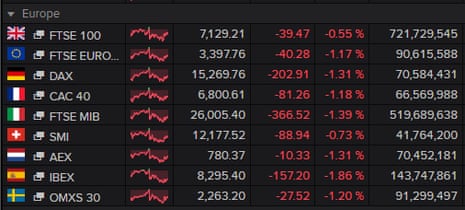Closing post
That’s all for today - here’s the main stories:
Rolling coverage of the latest economic and financial news

That’s all for today - here’s the main stories:


Alcoholic drinks companies have issued fresh warnings that the Christmas supply of wine, spirits and beer could be disrupted, after the government refused to provide an update on efforts to resolve the shortage of HGV drivers.
In an exchange in the Commons, the trade minister Ranil Jayawardena said he was “not going to provide a running commentary on numbers”, after being asked how many of 5,000 temporary visas earmarked for non-UK drivers had been issued.
The shadow trade minister Bill Esterson described Jayawardena’s refusal to provide an update as “extraordinary”. He said: “The reality is that the Wine and Spirit Trade Association warns of delivery chaos, of major delays on wine and spirit delivery times - up to five times longer than last year - and increases in freight costs; no doubt it won’t affect parties in Downing Street.
“I have to ask the minister: does he want to be responsible for cancelling Christmas celebrations elsewhere, because if he doesn’t, he needs to give a much better answer than the one he’s just given.”
The Labour MP cited a letter sent last week to the transport secretary, Grant Shapps, by 48 firms including Pernod Ricard, Moët Hennessy and the Wine Society, which said rising costs and supply chain “chaos” had increased the risk that supermarkets run dry and festive deliveries arrive late.
Drinks companies told the Guardian the situation was leading to extra costs and causing delays....
The Opec cartel and its allies have agreed to pump more barrels oil from January, but left the door open to putting the brakes on should the Omicron variant lead to further restrictions on travel and trade.
The global price of crude fell briefly to $66 per barrel, its lowest level since mid-August, after ministers from some the world’s biggest oil producing countries agreed to go ahead with a plan to increase production by 400,000 barrels a day in the new year.
However, prices swung back up after the Opec+ agreed the meeting would not formally close. The unusual move was so the cartel could “continue to monitor the market closely”, pending any new developments, and make “immediate adjustments” rather than wait for the next meeting on 4 January.
Thedecision to leave its oil production policy unchanged for now may suggest that Opec+ is banking on new travel restrictions being short-lived if existing vaccines prove effective against the Omicron variant, or if its symptoms are milder than earlier variants of the virus.
More here:
After another day buffered by omicron worries, European stock markets have closed in the red.
The UK’s FTSE 100 lost 39 points, or 0.55%, to 7,129 points, with oil companies cushioning the selloff. Shell gained 1.6% while BP finished 1.1% higher.
Catering group Compass (+0.9%) and bank NatWest (+0.8%) were also in the risers.
But cyber-security firm Darktrace was the top faller, tumbling 9%, a day after its relegation from the FTSE 100 in the next reshuffle was confirmed.
European markets saw steeper losses, with France’s CAC down 1.2% and Germany’s DAX losing 1.3%.

It’s been a choppy week, since the discovery of the Omicron variant led to travel restrictions being imposed.
Danni Hewson, AJ Bell financial analyst, predicts more volatility as officials work out exactly what to do about the new variant.
“There had been much speculation that fears Omicron would stall economies and cut demand for oil might prompt OPEC+ to think twice about its plans to up output in the new year. A volte-face would have pushed up the oil price at a time when consumers are already being sorely taxed by rising prices. The decision not to change tack at the moment will be something of a salve to markets which have endured days of volatility as investors try to get their heads around how big an impact this variant might actually have. Of course, the emergence of a new Covid strain has taken the pressure off the group to do more than they had planned, to up output beyond the agreed levels in a bid to curb rising inflation. Governments know squeezed living standards make for unhappy voters and President Biden in particular has waded into the argument, though the moves made by the US were rather limited in scale and therefore in impact.
“In response the oil price slipped, but only slightly and after a momentary pause which saw big oil shudder in response, both BP and Royal Dutch Shell shot quickly back into green territory and big oil stocks on Wall Street seemed to follow a similar path.
The White House has welcomed OPEC and its allies’ decision to increase oil output, but added that the U.S. has no plans to reconsider last month’s decision to release crude reserves.
UPDATE:🇫🇲 Final update on today's #Opec+ meeting where the group opted to once again stick with its plan to raise output by 400k b/d in January. But due to the many uncertainties around #Omicron, it crucially left open the door for further talks. #oott 🔓https://t.co/PIwsm7ipXS
— Nader Itayim | نادر ایتیّم (@ncitayim) December 2, 2021

One of the biggest unions representing BT workers has urged the business secretary to ensure any potential takeover bid protects the telecoms company’s 100,000 staff, its hundreds of millions in research spending and the national interest.
Prospect wrote to Kwasi Kwarteng days before BT’s largest shareholder is allowed to make a potential offer under UK takeover rules.
Patrick Drahi, the French-Israeli telecoms billionaire known for cost-cutting at businesses he controls, is free to make his next move from 11 December with the expiry of a no-bid clause that was triggered when he took his £2.2bn stake in June.
Mike Clancy, the general secretary of Prospect, said:
“The business secretary must take personal charge of making sure that any proposed takeover supports growing that investment, not a flight of money or skills overseas. We need a clear focus on protecting both our national interests and jobs while boosting private sector research and development (R&D), all of which could be at risk with a controversial takeover.”

Grab, the Southeast Asian unicorn with a superapp offering food delivery, ride-hailing and financial services has made a volatile entry onto New York’s Nasdaq today.
Victoria Scholar, head of investment at interactive investor, explains:
In a wildly volatile Nasdaq debut, shares in Grab have swung between gains and losses, now trading down nearly 10%, having initially opened up as much as 18%.
The Southeast Asian unicorn, which listed after a SPAC merger with Altimeter Growth Corp, is the most valuable tech business in the region with a market cap of almost $40bn. The Singapore ride-hailing firm raised $4.5bn from a number of investors including BlackRock and T. Rowe Price.
Although the company is yet to turn a profit, Grab is well-positioned to benefit from growth in South-East Asia and the accompanying demand for technology with its diversified business model covering deliveries, mobility and financial services. So far its food delivery business has had the most success, benefiting from the stay at home trend during the pandemic.
Investors are hoping that Grab can build momentum as we emerge from covid, having reported a slowdown in revenue and a widening EBITDA loss in its latest quarterly results.
In a volatile debut, #Grab has swung between gains & losses, now down nearly 10%, having initially opened up as much as 18%. Investors are hoping that Grab can build momentum as we emerge from #covid, having reported a slowdown in revenue & a widening loss in its latest results
— Victoria Scholar (@VictoriaS_ii) December 2, 2021
‘Tiz the season for festive forecasts, as analysts take a stab at what might happen to stock markets and the economy next year.
And in that spirit, Saxo Bank has today released its 10 Outrageous Predictions for 2022. Not things that it believes will happen, but potential risks which investors aren’t pricing in.
One is that US inflation soars above 15% in a wage-price spiral, a prospect that would keep Jerome Powell awake at night
In this scenario, Saxo says:
By the fourth quarter of 2022, the wages for the lower half of US incomes are rising at an annualised 15% clip as companies scramble to find willing and qualified workers who are increasingly selective due to a rising sense of entitlement as jobs are plentiful relative to the meagre availability of workers at all skill levels.
This creates a wage-price spiral, with inflation over 15% by 2023, forcing the Federal Reserve into a “too-little, too-late move” to tighten monetary policy faster in a desperate effort to tame inflation. But the central bank has lost credibility; it will take time to regain it, says Saxo.
The market impact would be severe : extreme volatility in US equity and credit markets. The JNK high-yield ETF falls as much as 20% and the VIXM mid-curve volatility ETF soars as much as 70%.
Other ‘outrageous predictions’ are that the US mid-term election brings constitutional crisis; a stand-off over the certification of close Senate and/or House election results preventing the 118th Congress sitting on schedule in early 2023.
Or, Facebook could be abandoned by younger users in protest at the mining of personal information for profit; the attempt by Facebook parent Meta to reel them back in with the Metaverse stumbles.
Another possibility: a group of women traders launch a coordinated assault on companies with weak records on gender equality. This would lead to huge swings in equity prices for targeted companies, in a more sophisticated version of the meme stock Reddit Army.
The other predictions are:
Chief Investment Officer at Saxo Bank, Steen Jakobsen says this year’s theme is ‘revolution’
There is so much energy building up in our inequality-plagued society and economy. Add to that the inability of the current system to address the issue and we need to look into the future with a fundamental view that it’s not a question of whether we get a revolution but a more a question of when and how. With every revolution, some win and some lose, but that’s not the point—if the current system can’t change but must, a revolution is the only path forward.
A culture war is raging across the globe and the divide is no longer simply between the rich and the poor. It’s also the young versus the old, the educated class versus the less educated working class, real markets with price discovery versus government intervention, stock market buy-backs versus R&D spending, inflation versus deflation, women versus men, the progressive left versus the centrist left, virtual signalling on social media versus real changes to society, the rentier class versus labour, fossil fuels versus green energy, ESG initiatives versus the need to supply the world with reliable energy—the list go on.
We collaborated globally on Covid vaccines in 2020 and 2021. Now we need a new Manhattan Project–-type endeavour to set the marginal cost of energy, adjusted for productivity, on the path to much lower levels while eliminating the impact of our energy generation on the environment. Such a move would unleash the most significant productivity cycle in history: we could desalinate water, make vertical farms feasible almost anywhere, increase computer powers to quantum states, and continue to explore new boundaries in biology and physics.”
So the optionality of the OPEC statement, i.e. this plan can be adjusted as needed and rounding up the cheaters for compensatory cuts....acts as a kind of market tourniquet. What to do about the members who can't produce up to their quotas, another issue.... #OOTT
— Patricia A Hemsworth (@phemsworth) December 2, 2021
Oil is now recovering some of its earlier losses, as traders digest Opec’s output increase, and its decision to keep today’s meeting ongoing in case immediate adjustments are needed.
Brent crude has risen back to $68.70 per barrel, only down 0.3% today.
Comments (…)
Sign in or create your Guardian account to join the discussion